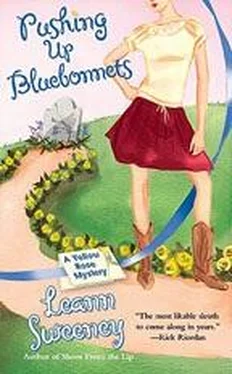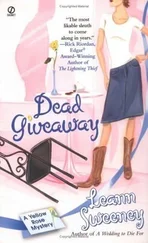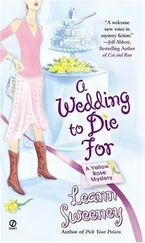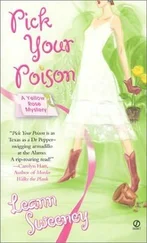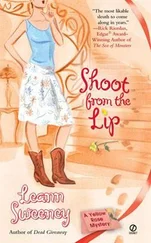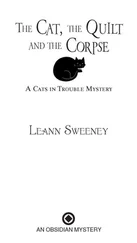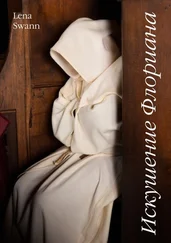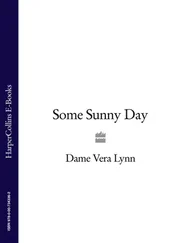"More than that," Cooper said. "We had one similar at the bureau. I heard it cost forty."
Hamlin nodded. "That's in the ballpark."
I kept exploring with my eyes. "Big old laminator, too. Nice desktop computer. So this is what you need to create the driver's license JoLynn had?"
"If the folder labeled 'holograms' and the one marked 'licenses' contain what they say they do, then yes. Dugan has every weight and color of paper and card stock in here. Probably has blank passports and Social Security cards, too." Hamlin's gloved fists rested on his hips as he glanced around the room like this was his best Christmas ever.
"But you don't know exactly what he's got in those filing cabinets?" I said.
"Have to wait on CSU to photograph everything before I start making my list for evidence collection. That hard drive is definitely going to the property room—that and who knows what else."
"We have to wait? Don't you have a camera?" I was beginning to sound as anxious as the third monkey on the Ark's gangplank.
Cooper rested a hand on my back. "If the guy wasn't dead, Hamlin could take his own pictures, but now we have to wait on CSU."
Hamlin added, "We know Dugan created and sold fake IDs, probably bribed someone to sell him the blank Social Security cards, but I want client and seller names. Dugan may be dead, but whoever he did business with is going down and that's why I have to dot all the t's and cross my eyes." He did cross his eyes then, probably hoping I'd chill out.
I had to smile, because this made him look like he had the mental capacity of a windshield wiper. "How long until CSU gets here?" I said, once he'd grinned back at me.
"They're part of Homicide Division," Hamlin said. "Homicide needs to come first and they have the Dugan crime scene to work. But come on over here. There's something a little strange that I can show you."
My hands still in my pockets, I walked over to the filing cabinet with Cooper alongside me. I'd left my bag in the unmarked and wished I had my phone so I could snap off a few of my own pictures.
Hamlin carefully bent over the open filing-cabinet drawer and pointed a gloved finger inside. "See what's under those files?"
"Looks like newspaper," I said.
"That's right. Wondered at first if the guy was lining the bottom of the drawer for some reason," Hamlin said. "But he didn't do that in any of the other drawers."
Being careful not to rest my stomach against the side of the drawer, I tilted my head and tried for a better look. "Looks like about an inch-thick stack of newspaper. Why no file? Dugan seems to have filed everything else."
Hamlin looked at me. "You sure you're not a cop?"
"She's not, but I'd sign her up," Cooper said. "Anything else unusual?"
"Nothing obvious," Hamlin said. "We have to wait."
An agonizingly long thirty minutes later a female CSU officer arrived and began photographing everything. Hamlin then removed the files to get at the newspapers beneath. From my vantage point in the doorway, I decided they were clippings, not entire newspapers. Lots of clippings. Hamlin set them on the spic-and-span desktop and the CSU officer took more pictures after Hamlin removed the letter-size manila folder that sat on top of them.
An unfiled folder? That was strange, too.
Hamlin glanced our way after opening the folder for the officer to photograph its contents. "We can take these to the kitchen counter while she finishes up in here." He turned to her. "The hard drive goes to Tech, the newspaper and folder to Latents when I'm done, okay?"
She nodded and went back to work.
Carrying the newspapers and folder away from his body like a tray of coffee, Hamlin joined us in the hall. "Let's see what we got here." He gestured with his head toward the front of the house.
We walked to the kitchen and Hamlin placed the stack on the immaculate granite counter. I caught the Houston Chronicle date header beneath the folder—looked like from two years ago.
Hamlin said, "I have my digital camera in the car. Be right back." He left before I could say anything.
I said, "But they already took pictures, and I thought he said—"
"He's taking his own photos," Cooper said. "If they send these for latent prints, none of us will know the importance or lack of importance of the newspapers. With his own set of pictures he can read what he wants whenever he wants and hopefully will share that info with us. That is, if it's anything related to JoLynn. Might be nothing, Abby. Just mementos."
"This doesn't feel like nothing, Cooper. Dugan concealed these things—though, I'll admit, not very well. But he had a locked door and probably left Georgeanne, and maybe JoLynn before her, with strict instructions to stay out of his office. From what we've learned, both women were under his thumb."
Cooper was about to respond, but Hamlin returned with his camera, breathing hard, rivulets of sweat running from his scalp.
He fiddled with his equipment for a second and then moved the folder aside to photograph the top article.
I took in a sharp breath and must have gasped, because Cooper and Hamlin said, "What?" in unison.
"Th-that article on top," I said. "That's the same one I found online about the Richters. And there was a copy under a clock in the Richter library."
Cooper said, "Maybe this is proof Dugan knew about the family, perhaps knew where JoLynn had gone."
Hamlin was squinting at the article. "And you know this how?"
"Long story," Cooper said. "But JoLynn definitely had a fake ID that I'm betting was made right here."
Hamlin fanned out the articles, then started taking pictures. This gave me time to look over the clippings. I began to understand their connection to the first one. These all seemed to be personal-interest stories from cities and towns all over Texas and beyond. Gosh, how I wanted to scoop them up and take them home rather than hunt them down one by one on the Internet, see how they were connected to the article about Katarina— that is, if they were connected.
"Do you mind if I get the newspaper names and dates on these?" I could look up the articles online and print them—at least the ones that were online.
"No problem." Meanwhile Hamlin picked up the folder he'd set aside and opened it.
I was glancing around the kitchen looking for something to write on, but the magnetic whiteboard on the fridge, the one that had the words "Georgeanne—milk today!" printed on it in black marker, probably wouldn't do.
Cooper took out his little notebook. "I'll help."
"Thanks." I read off the newspaper names and dates while Cooper wrote them in his notebook.
A minute later we were interrupted by Hamlin, who now held out a stack of photographs in his palm. "These were in the folder. They mean anything to you?" He placed them on the counter one by one, touching only a corner with his gloved hand.
The first one was a grainy shot of a petite blonde placing flowers on a grave. "That's JoLynn at Glenwood Cemetery. The caretaker told me a girl fitting her description brought flowers every week to Elliott Richter's family plot."
Hamlin looked confused. "So she is related to the Richters?"
"Since we know her mother abandoned her at a bus station when she was nine and Katarina was already dead by then, I doubt it," I said.
"Then why go to the cemetery?" Cooper asked. But he seemed to be asking himself this question, not us. "Unless she had someone take these pictures to show Elliott how devoted she was to Katarina, her long-lost mother . . . who was not really her mother."
"That doesn't make sense. How would she present these photos to Richter?" I said. "By saying, 'Oh, by the way, here's proof of what a loving family member I am.' I don't think so, Cooper. Maybe we should consider the possibility that Katarina placed JoLynn with someone and that's the person who abandoned her."
Читать дальше
